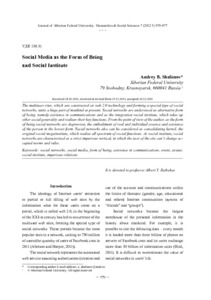Социальные медиа как форма бытия и социальный институт
Скачать файл:
URI (для ссылок/цитирований):
https://elib.sfu-kras.ru/handle/2311/2986Автор:
Шалимов, А.Б.
Shalimov, Andrey B.
Дата:
2012-07Аннотация:
The multiuser sites, which are constructed on web 2.0 technology and forming a special type of social
networks, unite a huge part of mankind at present. Social networks are understood as alternative form
of being, namely existence in communications and as the integration social institute, which takes up
other social generality and realizes their key functions. From the point of view of the author, as the form
of being social networks are degression, the embodiment of real and individual essence and existence
of the person in the lowest form. Social networks also can be considered as consolidating kernel, the
original social megainstitute, which realize all spectrum of social functions. As social institute, social
networks are characterized as a strict imperious vertical, in which the user of the site cant change accepted
norms and rules. Многопользовательские сайты, построенные по технологии веб 2.0 и образующие особого
типа социальные сети, объединяют на данный момент огромную часть человечества. В
статье рассматриваются социальные сети как альтернативная реальной форма бытия,
а именно существования в коммуникациях, и как интеграционный социальный институт,
постепенно поглощающий другие социальные общности, воплощая в себе их ключевые функции.
С точки зрения автора, как форма бытия социальные сети есть нисхождение, воплощение в
низшей форме реальных и индивидуальных сущности и существования человека. Социальные
сети также можно рассматривать как консолидирующее ядро, своеобразный социальный
мегаинститут, реализующий весь спектр социальных функций. При этом как социальный
институт, социальные сети характеризуются как строгая властная вертикаль, в которой
пользователь сайта никак не может изменить принятые нормы и правила.
Коллекции:
Метаданные:
Показать полную информациюСвязанные материалы
Показаны похожие ресурсы по названию, автору или тематике.
-
Mechanisms for Social Ties Formation in the Information Environment in Modern Domestic and Foreign Studies
Bereziuk, Svetlana V.; Koptseva, Natalia P.; Fil’ko, Antonina I.; Березюк, С.В.; Копцева, Н.П.; Филько, А.И. (Сибирский федеральный университет. Siberian Federal University, 2020-05)This article discusses the features of the emergence and strengthening of social ties in the studies of Russian scientists and their foreign colleagues. The main emphasis is made on the research studying these processes ... -
Социальная целостность государства и социальный экстремизм
Клачков, П.В.; Klachkov, Pavel V. (Сибирский федеральный университет. Siberian Federal University., 2012-03)Abstract: Based on the idea that the actions taken for both reinforcing and destructing the state entirety generally belong to the same social spheres, the author regards the social entirety of the state and social ... -
Оптимизация системы надомного обслуживания населения: новая модель
Малофеев, И.В.; Malofeev, Ivan V. (Сибирский федеральный университет. Siberian Federal University., 2011-04)The article is devoted to the new model for the optimization of the home care system based on modern organization and information technologies. The article includes the results of the motion and time study of social workers ... -
Orthodox Artistic Culture as a Traditional Means of Sacralization of Basic Social Ideals
Obmorokova, Anastasia M.; Nemaeva, Natalia O.; Обморокова, А.М.; Немаева, Н.О. (Сибирский федеральный университет. Siberian Federal University, 2016-02)This paper studies the phenomenon of a canonical orthodox icon-painting as a historically unaltered sacral space, which has operational characteristics of a sacralization system while semiotic- figurative structure of ... -
Перспектива институциональной трансформации российской высшей школы
Kislov, Alexandr G.; Кислов, А.Г.; Shmurygina, Ol’ga V.; Шмурыгина, О.В. (Сибирский федеральный университет. Siberian Federal University., 2013-03)The article is devoted to the identification (and self-identification) crisis that has been suffered lately in the sphere of higher education, and the prospects for overcoming it. In comparison with some developed countries, ...

